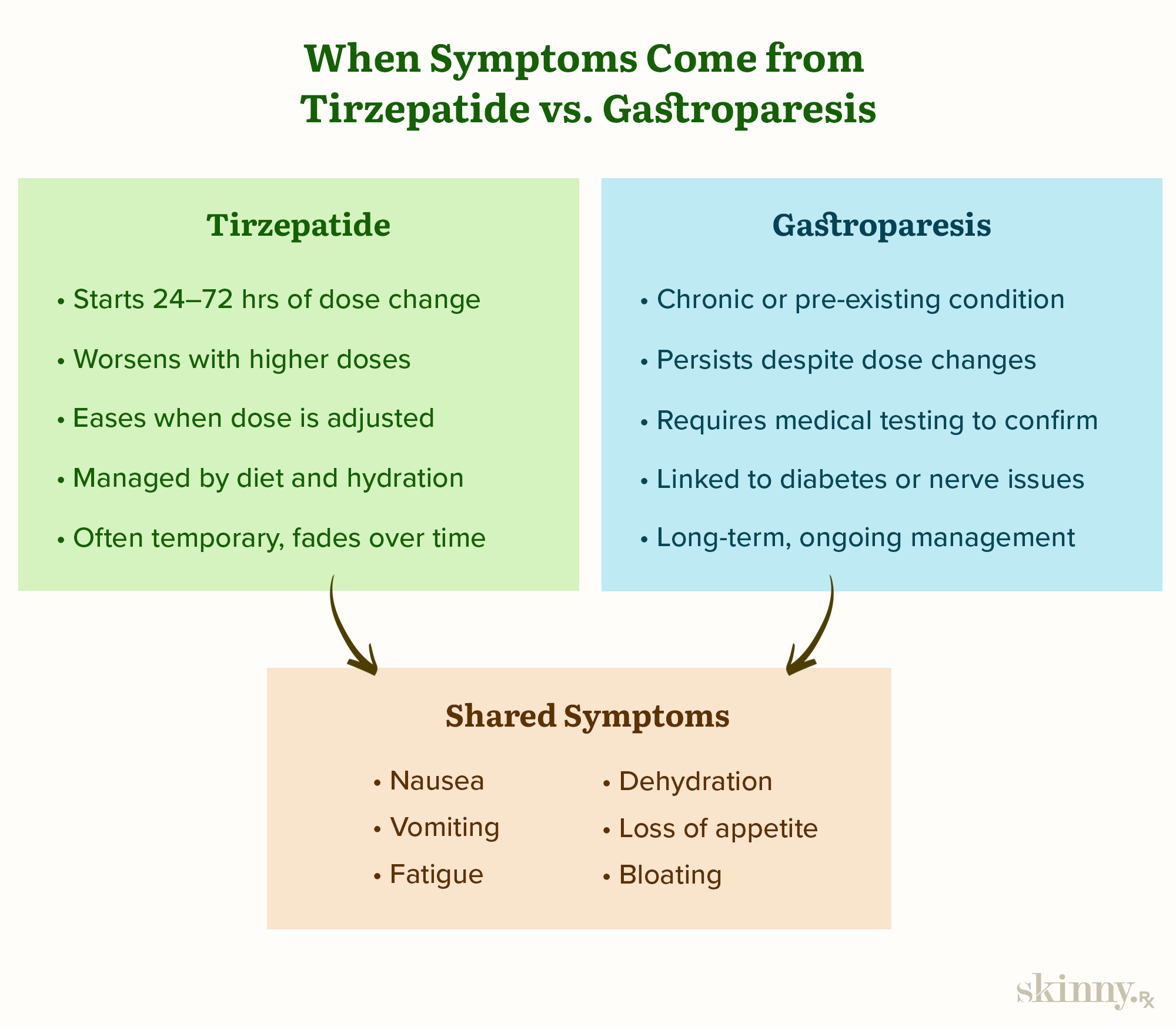
Key Takeaways
- Tirzepatide side effects often resemble gastroparesis, and symptoms like nausea, bloating, and vomiting alone cannot reveal the true source.
- Timing helps distinguish them, as drug side effects typically appear soon after dose changes, while gastroparesis is an ongoing condition.
- Tirzepatide symptoms usually fade with time, while gastroparesis is persistent and requires long-term care.
- Red flags like persistent vomiting or severe abdominal pain require prompt medical attention, rather than self-care.
- Overlapping symptoms don’t always rule out tirzepatide, but treatment decisions should be made with a medical doctor.
Tirzepatide side effects often resemble gastroparesis, with nausea, bloating, and vomiting making it difficult to know the true source of symptoms.
Timing is one of the clearest distinctions, since drug-related side effects usually appear soon after starting or adjusting a dose, while gastroparesis is ongoing.
Tirzepatide-related symptoms often improve or fade over time, while gastroparesis symptoms are persistent and require long-term management.
Certain warning signs, such as persistent vomiting or severe abdominal pain, indicate the need for prompt medical attention rather than self-care.
Overlapping symptoms should not necessarily prevent starting tirzepatide, but it is essential to understand the risks and work closely with a medical doctor when making treatment decisions.
Gastroparesis and tirzepatide share several unfortunate side effects. While this should not necessarily deter you from starting tirzepatide, you need to know how the drug interacts with the disease so you can make an informed decision.
Here’s what the science says.
The Gastroparesis Concern
Tirzepatide—you’d know it better by its brand names, Mounjaro or Zepbound—is at the frontier of pharmaceutical science for its efficacy in managing chronic conditions like type-2 diabetes and obesity. But if you suffer from gastroparesis, or stomach issues in general, there are factors to consider before hopping on.
Gastroparesis is more than an upset stomach; also known as stomach paralysis, this chronic condition delays or inhibits the normal functioning of your digestive system. The big question: Does tirzepatide cause gastroparesis? Not directly, but there are things to be aware of before starting tirzepatide.
The Science: How Tirzepatide Affects Your Stomach
Gastroparesis is a condition that inhibits your stomach muscles from physically moving food through your digestive tract. It can worsen if you take tirzepatide, which tends to have mainly gastrointestinal, or stomach-related, side effects of its own.
Moreover, gastroparesis:
- Does not have a definitively known cause
- Has been, “Sometimes linked to diabetes”
- Can create symptoms like “nausea, vomiting, and belly pain,” and, importantly,
- May worsen alongside medications that also delay gastric emptying, like tirzepatide or semaglutide.
What Is Gastric Emptying?
Studies have characterized gastric emptying as “a measure of the speed of delivery of gastric contents into the duodenum.” Put simply, It’s the movement of food particles through the stomach and into the small intestine.
While this process requires physical action by muscles deep within your body, the system as a whole is a complex web involving metabolic and hormonal triggers as well. There’s a lot going on under the hood, especially if you add tirzepatide into the mix.
The Role of GLP-1 Agonists
Tirzepatide, like semaglutide, is a GLP-1 agonist. Before we can understand the risks of tirzepatide for those with gastroparesis, we need to establish the mechanisms of the medication itself.
Glucagon-like peptide-1 is a hormone that your body naturally produces to regulate gastric emptying. Think of it like a traffic cop on a busy street, ensuring that nothing is moving too quickly.
Slowing down gastric emptying is one of the ways tirzepatide (and semaglutide, for that matter) helps people lose weight—it keeps food in your stomach longer, which helps you feel full.
But there’s certainly too much of a good thing, especially if you suffer from gastroparesis already.

Find Out If Tirzepatide Fits Your Journey
Your health and weight loss path is unique. Take a quick quiz to discover if tirzepatide could be the right next step for you.
Is It Gastroparesis or a Side Effect? Identifying the Symptoms
Something to keep in mind: Gastroparesis is a chronic condition with no known cause or cure. Luckily, symptoms are graded along a scale called the Gastroparesis Cardinal Symptom Index (GCSI).
The GCSI grades the severity of various gastrointestinal systems; studies tend to show that, for most people, these symptoms are mild or moderate.
What are the side effects of gastroparesis?
- Nausea
- Vomiting
- Bloating or abdominal distention
- Heartburn or acid reflux
- In severe cases, malnutrition and dehydration
Many of these symptoms are also commonly found in patients taking tirzepatide.
If you’re on tirzepatide, these might look familiar.
Common Side Effects of Tirzepatide
Tirzepatide medications like Mounjaro and Zepbound tend to have side effects that closely align with gastroparesis, particularly:
- Nausea
- Vomiting
- Fatigue
- Dehydration
- Loss of appetite
How To Know the Difference
Gastroparesis and the side effects of tirzepatide align closely. That’s unfortunate if you’re trying to distinguish whether you’re reacting poorly to the medication or if you’ve got a pre-existing condition.
Your best bet, of course, is to discuss this with your doctor. Barring that, consider:
- If your symptoms noticeably worsen in the hours or days after starting tirzepatide, it’s almost certainly due to the medication.
- Symptoms tend to correlate with dosage. The higher your dose of a medication, the more intense the symptoms you’ll experience.
- If you’ve been taking other meds to quell stomach issues, and then those treatments diminish in efficacy once you hop on tirzepatide as well, tirzepatide is the likely culprit.
Conversely, if you’ve never had any stomach troubles until starting tirzepatide, you likely don’t suffer from gastroparesis. More importantly, there isn’t credible data indicating that gastroparesis symptoms will persist indefinitely once you come off tirzepatide.

Important Considerations Before Starting Tirzepatide
If you’re on the fence about tirzepatide, you need to conduct a cost/benefit analysis of your own, especially if you suffer from gastroparesis. The most important thing to remember:
- As it can create many of the same symptoms, tirzepatide can worsen existing gastrointestinal issues, potentially pushing those symptoms over the edge of tolerability.
With this in mind, discuss starting tirzepatide with your doctor. If you have a history of prevalent stomach issues, they can help you make an informed decision. You’ll also want to check the degree to which you’ll receive financial assistance from your health insurance, if you have it.
Managing Gastroparesis-Like Symptoms
Let’s look at a real-world example. In early 2025, the journal Cureus posted a case study of a 57-year-old individual who started taking tirzepatide.
The patient went to the emergency room after weeks of eight-out-of-ten abdominal pain, vomiting, gastric distension, and other side effects associated with both gastroparesis and tirzepatide—he was taking a 2.5mg dose.
Before we get into solutions, here are some of the authors’ takeaways:
- Symptoms of this severity are rarely attributed to gastroparesis.
- The onset of these symptoms occurred shortly after the patient started tirzepatide
- Symptom severity is not always dose-dependent; this patient was taking the standard starting dose.
To the authors’ knowledge, this case marked the “first reported case of acute functional gastric outlet obstruction associated with tirzepatide.”
Why this matters for you: It’s important to recognize severe symptoms so you can have an informed perspective on what you’re feeling when you take a medication like tirzepatide. For most people, most of the time, side effects are manageable without medical intervention.
Dietary Adjustments
Here’s the good news—general dietary “best practices” apply pretty well if you’re taking tirzepatide or suffer from gastroparesis. We know that simple, practical changes can make a big difference for all manner of GI disorders (note that the paper cited above discusses irritable bowel syndrome, not gastroparesis specifically).
Some of these include:
- Eating frequent, small meals rather than gorging on large feasts
- Avoiding stomach irritants like spices, heavy oils or creams, or deep-fried foods
- Not drinking carbonated or fizzy beverages
Lifestyle Changes
On the physical activity front, you may also find relief by taking a short, 15 to 30-minute leisurely walk after a meal, which can improve digestion. While you’re physically eating, take time to chew your food thoroughly—don’t scarf things down in large bites.
On the upside, health-conscious choices made in the name of mitigating stomach-related side effects can also assist with your weight loss efforts. Eating slowly and moving more are sure-fire ways to improve satiety and burn more calories, creating a synergistic loop.

Something I often tell my patients is that many of the changes or habits they can use to help limit side effects of GLP-1 are also habits that can help them improve health and keep weight off in the long run, like the post-meal walks, chewing slowly, and not eating quickly, as well as avoiding fried foods and some of the fizzy drinks. However, not all fizzy drinks are necessarily 'bad'.
–
Dr. Daniel McGee, Board-certified Family Medicine Physician
When To Seek Medical Help
Let’s refer back to the aforementioned case study—it’s a good example of when you might want to head to the doctor. The patient in question
- Exhibited a noticeable increase in gastric symptoms after starting tirzepatide
- The symptoms mounted in severity
- The symptoms caused significant pain and inhibited normal bodily functions
Conditions like these are a good place to draw a line in the sand about seeking help. That said, mild or transient stomach pains or the occasional bout of nausea (provided it doesn’t lead to painful vomiting) are probably not worth worrying about, especially if you can employ some of the practical solutions outlined above.
Balancing Benefits and Risks
As with any medication, tirzepatide comes with its own inherent risks. These potential pitfalls can be deeper or more severe if you suffer from a condition with symptoms similar to the medication’s side effects, like gastroparesis.
But that doesn’t mean tirzepatide is off the table altogether. Start smart—talk to your doctor, who may recommend a slower on-ramp period of several months to help you adjust to the medication.
And, get informed on what the research has to say (luckily, we’ve done most of that legwork for you)—then decide if it’s time to take the plunge.
At SkinnyRx, we offer compounded GLP-1 medications within structured, physician-guided weight loss plans. You can take a quick assessment to learn whether this treatment is suitable for your needs.
Frequently Asked Questions

Find Out If Tirzepatide Fits Your Journey
Your health and weight loss path is unique. Take a quick quiz to discover if tirzepatide could be the right next step for you.


 Medically Reviewed
Medically Reviewed



